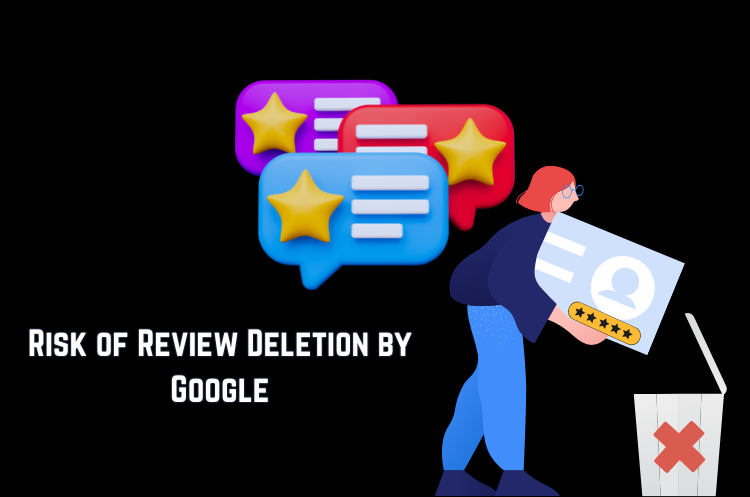
Reasons to Avoid Purchasing Google Reviews
In the digital age, where a vast majority of consumers rely on online reviews to make informed decisions about products and services, maintaining a positive online reputation has become paramount for businesses. However, the temptation to boost one’s image through dubious means, such as purchasing Google reviews, can have severe consequences. In this blog post, we explore five compelling reasons why businesses should steer clear of this practice.
- Legal Consequences with the FTC:
Engaging in the purchase of fake Google reviews isn’t just a breach of ethical conduct; it’s also a violation of the law. Under Section 5 of the Federal Trade Commission Act, the FTC considers such actions as false or deceptive advertising, potentially resulting in substantial fines. In 2019, a business faced a staggering $12.8 million fine for indulging in this fraudulent practice, highlighting the gravity of the legal implications.
- Risk of Exposure and Reputation Damage:
Attempting to boost your online reputation through purchased reviews carries the risk of exposure. If the arrangement between the business and reviewers becomes public, it not only erodes consumer trust but also draws the attention of Google. This can lead to penalties that could further damage the business’s reputation. Transparency is key to building and maintaining a genuine and trustworthy online presence.
- Recognition of Fake Reviews by Consumers:
Consumers today are savvy in detecting inauthentic reviews, with over 80% having encountered them in 2019. Various red flags, such as inactive Google Maps profiles, suspicious review patterns, or sudden influxes of multiple reviews, can raise suspicions. Additionally, online shoppers have access to tools that help identify common indicators associated with fake reviews. Businesses risk losing credibility and customer trust if caught engaging in such deceptive practices.
- Loss of Genuine Feedback:
The pursuit of fake reviews denies businesses the opportunity to receive authentic feedback from customers. Negative reviews, although sometimes uncomfortable, offer valuable insights into areas that need improvement. Treating negative feedback as constructive criticism allows businesses to enhance their products and services, contributing to overall customer satisfaction and loyalty.
- Risk of Review Deletion by Google:

Google explicitly prohibits fake reviews in its content policy and employs mechanisms to detect and remove them. Attempts to manipulate a business’s ratings through fraudulent means can result in the removal of reviews from the profile. Google places a strong emphasis on genuine experiences to uphold the integrity of its review system.
The Right Approach with Build Brand Better:
Instead of resorting to unethical practices, businesses can adopt legitimate strategies to enhance their Google reviews. Here are some recommended approaches:
Promptly Ask for Feedback: Nearly 80% of people are willing to leave a review when asked, so make it a point to request feedback after each transaction.
Use Google Review Link Generator: Simplify the review process for customers by providing them with a direct link to leave a review.
Leverage Automation: Platforms like Build Brand Better’s online reviews solution can automate the process of requesting reviews, making it seamless for both businesses and customers.
Engage with Reviews: Responding to all reviews, whether positive or negative, demonstrates a commitment to customer engagement and care.
Continuous Improvement: Address customer concerns and pain points, making satisfaction a core aspect of your business culture.
About Build Brand Better:
Build Brand Better is a reputable online reputation management company dedicated to assisting businesses in establishing and maintaining a positive digital presence. Their tailored solutions prioritize authentic strategies to enhance online reputation, fostering sustained growth and customer trust. With Build Brand Better, businesses can navigate the digital landscape with confidence, building a reputation that genuinely reflects the excellence of their products and services.
FAQ
Q1: Is it illegal to buy Google reviews for my business?
A1: Yes, buying Google reviews is not only ethically questionable but also illegal under Section 5 of the Federal Trade Commission Act (15 U.S.C. 45). The Federal Trade Commission (FTC) considers fake reviews as false or deceptive advertising, and businesses engaging in such practices may face substantial fines.
Q2: What are the potential legal consequences of purchasing fake reviews?
A2: The legal consequences can be severe, with potential fines reaching into the hundreds of thousands or even millions of dollars. In 2019, a business faced a $12.8 million fine for participating in the fraudulent practice of buying fake reviews.
Q3: Can purchased reviews be detected by consumers?
A3: Yes, consumers are adept at spotting fake reviews. Various indicators, such as inactive Google Maps profiles, suspicious review patterns, or sudden bursts of multiple reviews, can raise suspicions. Additionally, there are tools available for online shoppers to identify red flags commonly associated with inauthentic reviews.
Q4: Why is transparency crucial in maintaining a positive online reputation?
A4: Maintaining transparency is essential to building a genuine and trustworthy online presence. Attempting to boost your online image through purchased reviews carries the risk of exposure, potentially eroding consumer trust and damaging the business’s reputation.
Q5: Are negative reviews always harmful to a business?
A5: Negative reviews, while sometimes uncomfortable, provide valuable insights into areas that need improvement. Treating negative feedback as constructive criticism allows businesses to enhance their products and services, contributing to overall customer satisfaction and loyalty.
For more Blogs:- www.buildbrandbetter.io/blog/
